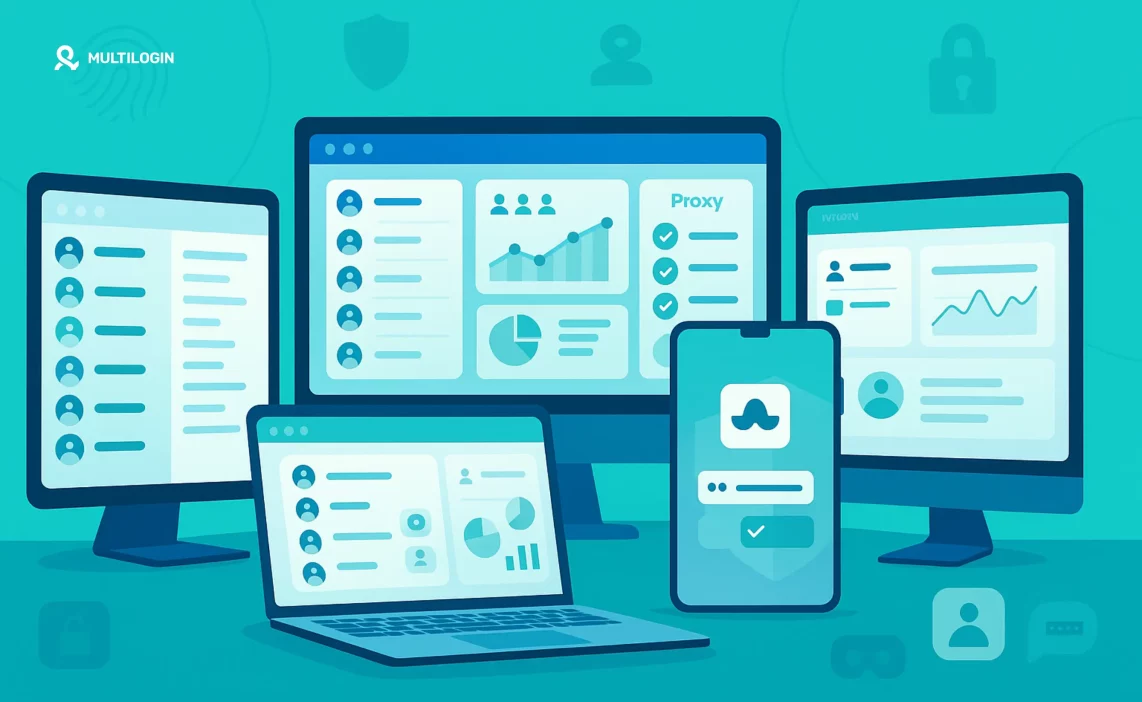Did you know that more than 60% of market research teams now use an antidetect browser to gather competitive intelligence—without risking bans or data distortion?
Traditional browsers expose your fingerprint, trigger captchas, and get accounts locked. If you want true, unfiltered insights, you need a tool that lets you blend in, scale up, and stay undetected.
But with so many anti detect browsers on the market, which ones actually deliver for research, competitor tracking, and multiaccount management? This guide reveals the 10 best antidetect browsers for market research in 2026—including key features, use cases, and who each browser is best for.
What Is an Antidetect Browser (and Why Do Researchers Need One)?
An antidetect browser (or anti detect browser) is a privacy browser that creates multiple isolated profiles, each with its own unique fingerprint, proxy, and environment.
For market research teams, these tools:
- Prevent bans and shadowbans on competitor sites
- Let you run dozens (or hundreds) of accounts for secret shopping, ad checks, and price monitoring
- Unlock unbiased, geo-targeted results
- Pair with proxies for maximum stealth
Top 10 Antidetect Browsers for Market Research (2026)
1. Multilogin
Best For: Teams, agencies, advanced researchers, global-scale projects, and anyone who needs the most realistic, reliable, and scalable anti detect browser profiles.
Core Features:
- True-to-life Browser Fingerprints: Generate ultra-realistic Chrome and Firefox profiles that mimic real devices down to screen resolution, font lists, WebGL, audio, and more.
- Team Collaboration: Role-based access, profile sharing, permissions, and project folders. Perfect for distributed teams and agencies.
- Cloud and Local Profiles: Save browser environments securely in the cloud or locally. Switch between devices without losing sessions.
- Automation API: Integrate with Selenium/Puppeteer for automated market research, ad verification, or bulk data collection at scale.
- Native Proxy Management: Seamless support for proxies with easy assignment per profile.
- Profile Notes & Labels: Keep your research organized with detailed tags, notes, and custom metadata.
- Stealth Mode: Advanced masking for WebRTC, Canvas, and other tricky fingerprint vectors.
Unique Strengths:
- Unmatched fingerprint customization: Prevents detection by even the strictest anti-bot systems.
- Enterprise-grade security: Full encryption, audit logs, and compliance tools.
- Large-scale research: Easily manage hundreds of profiles for multi-country or competitor research.
Limitations:
- Paid-only (no free plan): But there’s a 3-day paid trial (€1.99).
- Requires onboarding: Slightly steeper learning curve for beginners, but worth it for teams/agencies.
2. Kameleo
Best For: Advanced market researchers, privacy enthusiasts, or anyone needing mobile browser profiles and ultra-fine fingerprint customization.
See Kameleo review here. You can also read full Multilogin vs Kameleo comparison here.
Core Features:
- Multiple Browser Engines: Chrome, Firefox, Edge, and real mobile browser emulation (Android/iOS).
- Deep Fingerprint Control: Customize WebGL, audio, fonts, screen resolution, OS, and much more.
- API & Automation: Integrate with Selenium, Puppeteer, or their own mobile app for automated testing and market research.
- Proxy Support: Use residential/mobile proxies per profile.
- Offline/Local Profiles: Profiles are stored locally, no forced cloud usage.
Limitations:
- Local only: No cloud profile sync or sharing.
- Learning curve: Geared to technical users; less user-friendly for beginners.
3. MoreLogin
Best For: Budget-focused researchers, individuals, and small teams who need basic multi-account management with minimal cost.
See MoreLogin review here. You can also read full Multilogin vs MoreLogin comparison here.
Core Features:
- Chromium-Based Profiles: Easy creation and management of multiple browser sessions.
- Basic Fingerprint Spoofing: Covers most key vectors for research and multiaccounting.
- Proxy Integration: Set a different proxy for each profile (residential/mobile supported).
- Simple Team Features: Share profiles, basic permissions.
- Cloud Storage: Keep profiles synced across devices.
Limitations:
- Fewer advanced features: Not suitable for high-stakes or enterprise-scale research.
- Limited automation and bulk management tools.
4. SessionBox
Best For: Quick, lightweight browser session splits—NOT a full antidetect browser, but handy for small research projects.
See SessionBox review here. You can also read full Multilogin vs SessionBox comparison here.
Core Features:
- Browser Extension: Run multiple sessions in tabs, keep cookies and storage isolated.
- No profile fingerprinting: Does NOT mask device/browser details.
- Syncs across devices: Profiles can be accessed from anywhere.
- Easy setup: No learning curve.
Limitations:
- No anti-fingerprinting: Not suitable for sites with advanced detection.
- Limited to session isolation, not privacy.
5. VMLogin
Best For: Bulk research and automation on a budget, small agencies, and individual market researchers who want desktop-based profile management.
See VMLogin review here. You can also read full Multilogin vs VMLogin comparison here.
Core Features:
- Windows App: Manage thousands of profiles locally.
- Fingerprint Spoofing: Chrome-based, with isolation of cookies, storage, etc.
- Automation Support: API for custom scripting and automated research flows.
- Team Collaboration: Multi-user support, permissions, and shared environment.
- Profile Notes: Helps keep research organized.
Limitations:
- Windows only: No Mac/Linux/web version.
- UI less polished: Can be clunky compared to newer tools.
6. Undetectable.io
Best For: Early adopters, privacy maximalists, and researchers wanting the latest in anti-fingerprinting.
See Undetectable.io review here. You can also read full Multilogin vs Undetectable.io comparison here.
Core Features:
- Chromium & Firefox Engines: High-level spoofing, randomization, and customization.
- Bulk Profile Creation: Fast setup for mass research projects.
- Proxy Support: Built-in, with flexible integrations.
- Cloud & Local: Save profiles in the cloud or locally for flexibility.
Unique Strengths:
- Next-gen anti-fingerprint tech: Adapts to new tracking methods quickly.
- User community: Fast-growing, responsive support.
Limitations:
- Still maturing: Some features may be in beta.
- Small user base: Less documentation, new player in the market.
7. Dolphin Anty
Best For: Advanced researchers and automation pros who need bulk profile management and custom scripts.
See Dolphin Anty review here. You can also read full Multilogin vs Dolphin Anty comparison here.
Core Features:
- Bulk Account Creation: Manage hundreds of sessions easily.
- Scripting Tools: Supports automation for repetitive research or scraping.
- Proxy Management: Integrates with all major proxy types (including Nodemaven).
- Team Management: Permissions, logs, and shared folders.
- Cloud Storage: Profile sync and sharing.
Unique Strengths:
- Focused on automation: Great for researchers running programmatic or AI-powered data collection.
Limitations:
- Geared to power users: Less suitable for beginners or small-scale research.
8. GoLogin
Best For: Solo researchers, SMBs, and those who want a cloud-based antidetect browser that’s beginner-friendly but still powerful.
See GoLogin review here. You can also read full Multilogin vs GoLogin comparison here.
Core Features:
- Cross-Platform: Use on Windows, Mac, Linux, and directly in your browser (cloud/web version).
- Browser Engine: Based on Chromium, with high-quality fingerprint spoofing.
- Cloud Profile Sync: All browser profiles and research sessions are stored in the cloud for instant access from any device.
- Proxy Manager: Built-in, supports HTTP, SOCKS, residential/mobile proxies.
- Automation: API and integrations for scraping or repetitive research.
- Profile Groups & Tags: Organize projects, split research between brands, or regions.
Limitations:
- Slightly less advanced fingerprinting than Multilogin
- Less granular team controls: Not ideal for large research teams.
9. AdsPower
Best For: Researchers needing to manage a high volume of browser sessions, agencies tracking many competitor accounts, or bulk social/marketplace research.
See Adspower review here. You can also read full Multilogin vs Adspower comparison here.
Core Features:
- Spreadsheet-Style Interface: Easily monitor, label, and switch between hundreds of browser profiles.
- Multi-User Management: Add teammates, assign research tasks, and monitor activity.
- Automation Tools: Built-in scripting, batch operations, and bulk data handling.
- Proxy Management: Assign a unique proxy to each session/profile; built-in support for all proxy types.
- Cloud Sync: Store and recover profiles online.
- Notifications & Logs: Track activity, session duration, and research workflow for compliance.
Limitations:
- Chrome-only: No Firefox or mobile engine.
- Interface can be overwhelming for small projects.
10. Incogniton
Best For: Freelancers, consultants, and individual researchers wanting a user-friendly, Chrome-based antidetect browser with strong basic features.
See Incogniton review here. You can also read full Multilogin vs Incogniton comparison here.
Core Features:
- Chromium-Based: Spoofs most key browser fingerprints, easy for new users.
- Profile Notes, Folders, Tags: Great for organizing research and tracking findings.
- Cookie Import/Export: Import session cookies for rapid logins or cross-platform research.
- Team Access: Invite others and share profiles, though less granular than Multilogin or AdsPower.
- Bulk Profile Actions: Duplicate, archive, or export profiles for efficient workflow.
Limitations:
- No Firefox or mobile browser emulation.
- Fewer automation options: Advanced scripting/API is less developed.
How to Choose the Right Antidetect Browser for Market Research
Here’s your quick guide—think about what matters for YOUR workflow:
- Research scale: Need 5 profiles or 500? Choose a tool that matches your scale.
- Fingerprint quality: For competitor analysis, realistic fingerprints = real results. Multilogin is the clear winner here.
- Team collaboration: If you have more than one researcher, look for robust permission management.
- Cloud or local: Want to work from anywhere? Cloud sync is a must.
- Proxy compatibility: You’ll need to use residential/mobile proxies (like NodEmaven) for geo research. Ensure your browser supports easy proxy integration.
- Automation: Advanced research? API and scripting support are non-negotiable.
Step-by-Step: Setting Up Multilogin for Market Research
Ready to get hands-on? Here’s how to onboard as a market researcher using Multilogin:
1. Sign Up & Get the €1.99 Paid Trial
- Visit Multilogin and grab the trial—3 days.
2. Create a Browser Profile
- Click “Create New Browser Profile.”
- Select your browser type (Chrome/Firefox), OS, and language to match your research target.
3. Add a Proxy
- Choose a high-quality residential proxy (built-in or external).
- Enter proxy details; Multilogin does the heavy lifting.
4. Customize Your Fingerprint
- Use the auto-settings for best results or adjust device parameters if you’re researching a niche segment (e.g., mobile users, different OS).
5. Launch, Research, Repeat
- Open the profile, visit your target sites, and perform your market research anonymously.
- For team research: Assign profiles, manage permissions, and share findings securely.
6. Export or Automate
- Export data, automate repetitive research, and scale up as needed.
Ready to Try the Best? No Risk, Big Upside
Why settle for half-measures or take risks with your privacy and accounts?
FAQs about Top Antidetect Browsers for Market Research in 2026
An antidetect browser is a privacy-focused browser that hides or changes your digital fingerprint—letting you appear as different users or devices, essential for market research, competitor analysis, and multi-accounting.
VPNs change your IP, but don’t spoof browser fingerprints. Incognito mode only hides your local history. Modern sites look at way more than just IP! Antidetect browsers change all those little clues—making you truly “invisible” online.
Yes—for legitimate research and competitor analysis, using an antidetect browser is legal in most jurisdictions. But always follow local laws and company policies.
You can, but be warned: Free proxies are slow, unstable, and get flagged fast. For best results, use high-quality residential proxies from reputable providers like NodEmaven—built right into Multilogin and other top browsers.
Final Verdict: Start Researching Smarter!
Let’s get real: In 2026, market research is a high-stakes game. The days of flying under the radar with just a VPN are over.
If you’re not using an antidetect browser for your market research, you’re leaving data, money, and competitive edge on the table.
Why struggle with bans, bias, or limited access when you could be:
- Getting real, unbiased results
- Researching any market, any region
- Scaling your research team with ease
- Staying completely under the radar
Don’t wait for your competitors to wise up first. Be the researcher who sets the curve, not the one playing catch-up.


